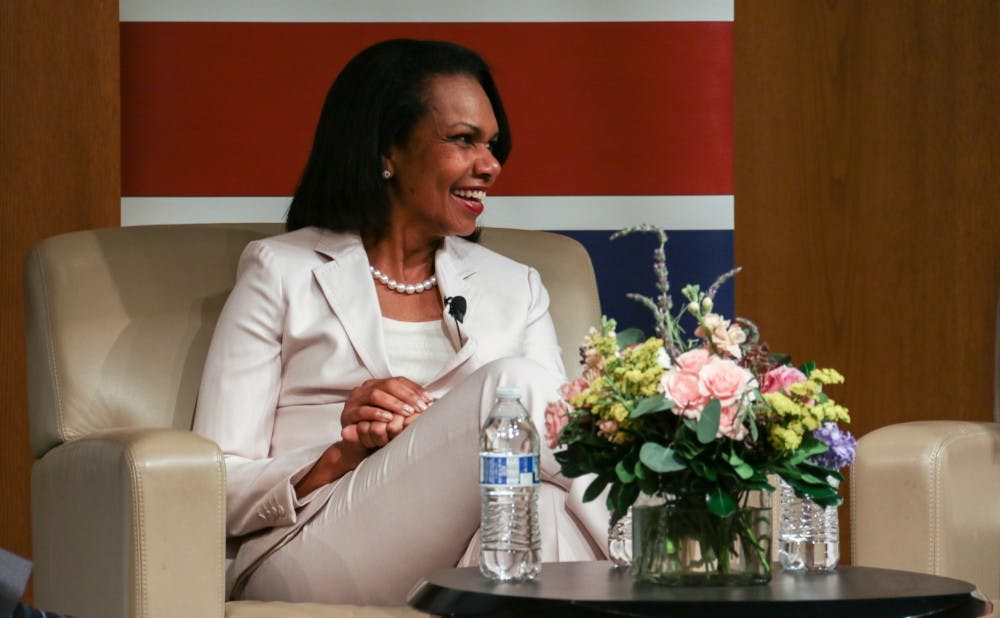Former Secretary of State Condoleezza Rice visited Duke Thursday evening to discuss her new book and to offer her take on current international hot topics, including North Korea and the Iran Nuclear Deal.
Rice was the first African-American woman to serve as secretary of state from 2005-2009. She was joined on stage Thursday by Amy Zegart, co-director of the Center for International Security and Cooperation at Stanford University, as they discussed their book entitled “Political Risk: How Businesses and Organizations Can Anticipate Global Insecurity” at an event sponsored by the American Grand Strategy Program.
Rice noted that political risk has been historically overlooked in favor of examining other types of risk and how to mitigate them.
“We thought that a lot of people had written about business risk—how to think about what kind of return on an investment you’re going to get and so forth,” Rice said. “But the slices of political risk have been multiplying.”
Although political risk has been traditionally associated with socialist dictators seizing private industries, the term has taken on a new meaning. Now, political risk generally refers to the effects that a government’s decisions might have on a company, Rice explained.
She emphasized that political risk is not necessarily a phenomenon originating with governments, as an ordinary person documenting an event can have wide-reaching political implications. She referenced the April 2017 video of a passenger being dragged off an overbooked United Airlines flight as an example.
“We talk about the fact that social activism has been democratized in a sense by technology…Anybody with a cell phone can subtly present political risk to your company—just ask United Airlines,” Rice said.
Rice and Zegart explained that the idea behind the book came from a class they taught at Stanford Graduate School of Business about political risk. Many students lauded the course, and some even wished the class would have lasted longer, Zegart said. Several students also suggested that the materials and topics discussed in class would make for a great book, an idea that Rice and Zegart followed through with when their book was released this month.
One difficulty in dealing with political risk, Zegart added, is related to the difficulty of using the knowledge of risk to make the most rational decision in a given situation.
“We humans are terrible with probabilities—it’s why we’re worried more about shark attacks than heart attacks,” she said. “There are all these cognitive biases or mental shortcuts that we use in our daily lives that make us blind to the real probability distribution.”
Zegart mentioned that optimism biases are particularly prominent in business settings since the people occupying high positions in a business have likely taken many successful risks already in order to rise to that role.
The conversation then turned to current events, including the recent confirmation of Secretary of State Mike Pompeo. Zegart lauded Pompeo for his accomplishments as the director of the Central Intelligence Agency under a president who often shows skepticism toward the intelligence community.
Rice noted that Pompeo’s good relationship with President Donald Trump “will serve him very well” in his new role and applauded his efforts to fill vacancies in the State Department.
“No secretary of state can survive very long if the president and the secretary of state are not on the same page,” she said. “You cannot be off in some part of the world talking about something, and people know you’re not representing the president and you’re not representing the country.”

Rice credited former Secretary of State Rex Tillerson with his work in North Korea but criticized his and the White House’s inability to staff the senior ranks of the State Department.
Speaking about North Korea, Rice attributed the recent talk about negotiations with North Korea to a changing climate of factors that America has never seen before.
“For the first time, an American president faced the prospect of a North Korean regime that was going to have a nuclear weapon capable of reaching the United States,” she said. “And no American president is going to let that happen.”
She advised President Trump not to get into the details of an agreement when speaking with Kim Jong-un, who is the supreme leader of North Korea. Rather, Trump should “set the table” and leave the particulars to other officials, such as the secretary of state.
On the Iran Nuclear Deal, Rice explained that she would prefer Trump stay in the deal but that it would not be the “end of the world” if the United States pulled out.
Zegart disagreed with Rice’s assessment, claiming that Iran might also leave the deal alongside the United States, which would result in nuclear proliferation and a deepening schism between the United States and Europe.
In response to a question by senior Matthew King about the riskiness of millennials, Rice characterized millennials as motivated yet overly preoccupied with the distant future.
“One thing I do see in my students is wanting to know the next five steps ahead of you,” she said. “So my advice would be [to] know the next step ahead of you, do that well, make sure that it’s something that stretches you some—that makes you do things that are hard and you’re not accustomed to doing—and don’t try to plan the next three or four steps.”
First-year Ethan Astrachan, who attended the event, said that he was impressed by the wide range of information Rice presented during the discussion.
“She was very knowledgeable and also presented it in a way that was interesting to me, especially talking about risk aversion and optimism bias,” he said. “I thought that was a particularly interesting topic.”
Get The Chronicle straight to your inbox
Signup for our weekly newsletter. Cancel at any time.

